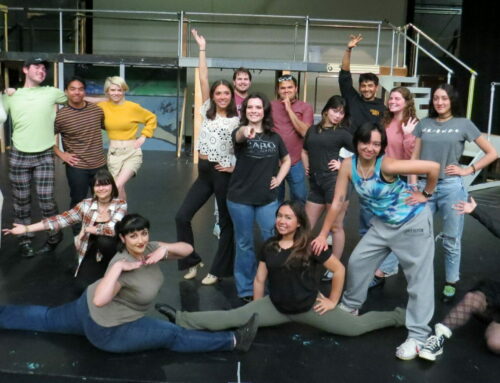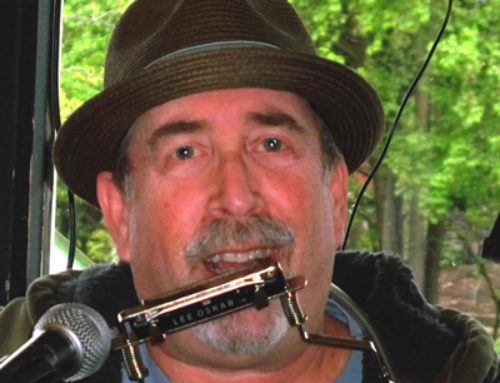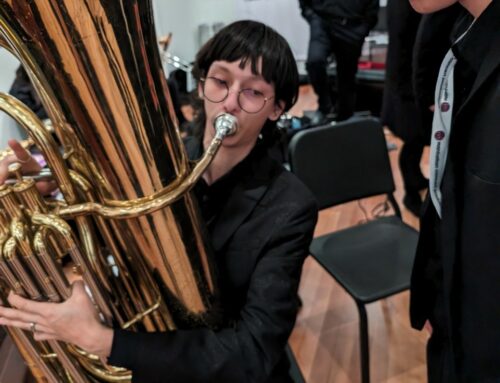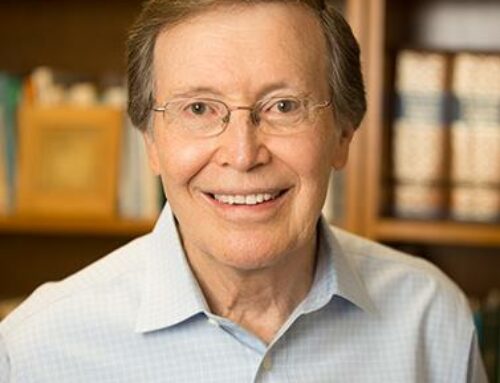Show uses fun songs, dances, humor to reveal dark side of human nature
![]()
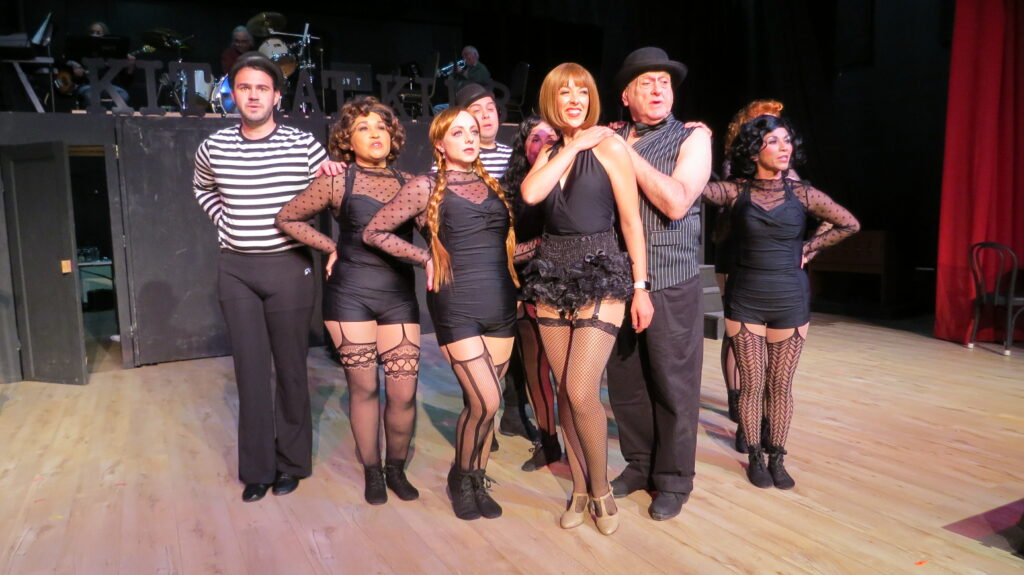
Photo by Marty Cheek
Sarah Duarte (center) as singer Sally Bowles and Billy Tindall (in bowler) as Emcee perform with Kit Kat Klub “girls” and “boys” in South Valley Civic Theatre’s musical “Cabaret.” The show opens March 11.
By Marty Cheek
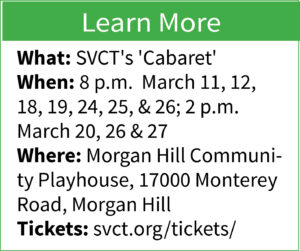 Life is a cabaret! And it’s especially so in the South Valley Civic Theatre’s musical that takes a dark look at how a nation can fall to fascism.
Life is a cabaret! And it’s especially so in the South Valley Civic Theatre’s musical that takes a dark look at how a nation can fall to fascism.
“Cabaret” opens March 11 for a three weekend run at the Morgan Hill Community Playhouse. Blending singing and dancing with comedy and drama, the show takes audiences to a seedy nightclub in 1930 Berlin. It explores the last days of Germany’s Weimar Republic where people fall in love but find their romance threatened by the rise of Nazism.
The show is co-produced by Robin Bezanson and Judy Grant and directed by Carol Harris. SVCT originally planned to perform it in spring 2020 but, after a few rehearsals, the COVID-19 pandemic forced it to be delayed.
After being gone for two years and the stress of what happened over the last two years, there was a question of whether or not SVCT should do such a serious show, Bezanson said.

The heavy themes of the show – which include racism, the rise of autocracy, and the darker side of human nature – is lightened by the slapstick jokes and comic music interlaced into the story’s plot, Harris said.
“It’s a very dark show but it does have a lot of humor in the first act. Act One and Act Two are totally different,” she said. “Act One has some happy spots and romantic relationships. But Act Two is a downer. Nothing goes right from the beginning of Act Two to the end. It’s an omen. The show is an omen to us that if we don’t pay attention to our history, it may repeat itself.”
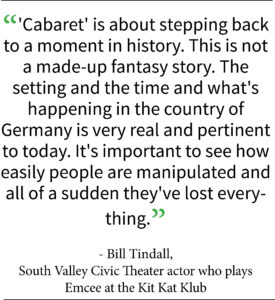 The cast consists of Billy Tindall as the eccentric master of ceremonies of the Kit Kat Klub, Sarah Duarte as the nightclub’s star performer Sally Bowles, and Vaughn Mayer as a struggling novelist Clifford Bradshaw who comes to Berlin seeking inspiration. Other performers include Joy Reynolds, Mary Beth Anderson, Peter Mandel, Michael Grimm, Marty Cheek, Marilyn Pifer, Joyce Bedard, Helen Huang, Reggie Reynolds, Megan Griffin, Patty Reinhart, Christine Carrillo, Jillian Grotz, Brooklyn Butler, Mason Bell, Eric Bruckner and Christopher Cruz.
The cast consists of Billy Tindall as the eccentric master of ceremonies of the Kit Kat Klub, Sarah Duarte as the nightclub’s star performer Sally Bowles, and Vaughn Mayer as a struggling novelist Clifford Bradshaw who comes to Berlin seeking inspiration. Other performers include Joy Reynolds, Mary Beth Anderson, Peter Mandel, Michael Grimm, Marty Cheek, Marilyn Pifer, Joyce Bedard, Helen Huang, Reggie Reynolds, Megan Griffin, Patty Reinhart, Christine Carrillo, Jillian Grotz, Brooklyn Butler, Mason Bell, Eric Bruckner and Christopher Cruz.
Tindall saw a revival of “Cabaret” on Broadway in 2000, enjoying a table on the stage as the British actor Alan Cummings performed as “Emcee.” That helped inspire him to take on the same role with SVCT’s version of the show. He hopes audiences will see the parallels with Germany’s history of fascism and the world’s current events.
“Here are these people living their lives and then all of a sudden everything is pulled out from under them. It’s just like Ukraine right now,” he said. “I feel like it’s an important message that’s out there all the time but people forget.”
What is the show’s message? “Be aware of what’s happening around you. Be knowledgeable about what your government is doing and what other people are thinking,” he said. “The message is current as it can possibly be right now.”
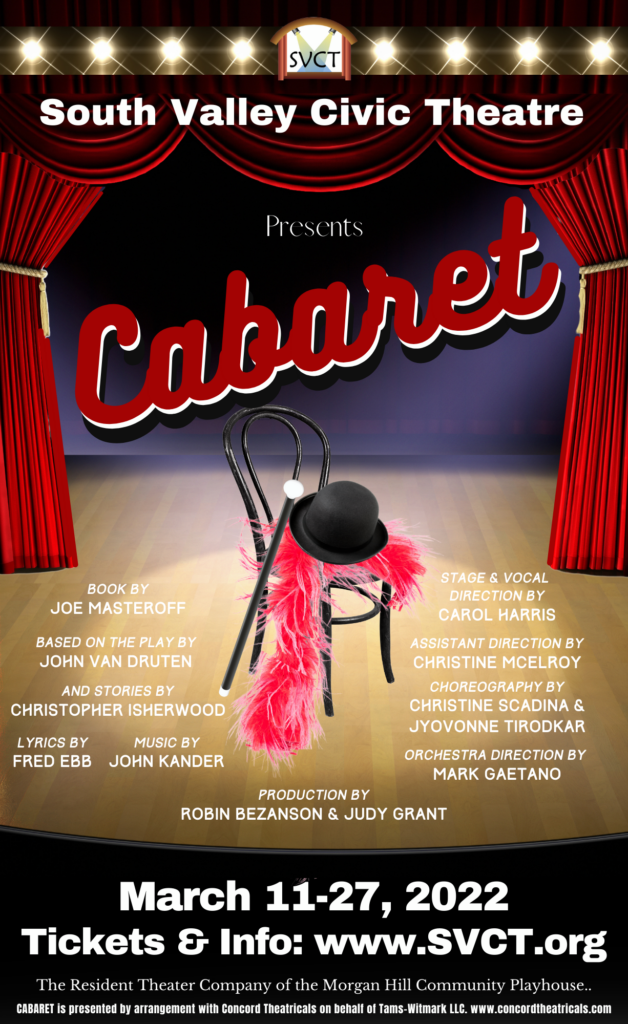 Emcee is “the conscience of the show,” he said in his approach to playing the part.
Emcee is “the conscience of the show,” he said in his approach to playing the part.
“He lures the audience into really seeing what’s going on,” he said. “He gives them a sense of complacency at the beginning — and then he wants to give them the message. He’s not the storyteller but he’s the one who leads them down the path to the story.”
Duarte studied opera in college and has performed in various bands, empowering her to belt out the songs at the cabaret with a powerful voice. She performs the role of Sally Bowles as a superficial party girl using drugs, alcohol and sex to fill a tragic void in her soul.
“She’s very sad. I think she’s relatable because she’s self-destructive and, unfortunately, I think that’s something all of us are subject to at one point in time or another,” Duarte said. But you have hope during the show that at some point she’s going to be able to turn it around. And then she doesn’t. And that’s really the tragedy of her and the show. Nobody is really able to escape the impending doom that’s coming.”
Vaughn auditioned for a role as a Kit Kat Klub “boy” in the cabaret, and soon after received a call from the producers offering him a starring role as Cliff.
“It was a pleasant surprise. I love the story of ‘Cabaret’ and I love how all the characters are all broken in certain ways,” he said. “What I love about Cliff is that he’s got that writer’s observation. Like most writers, he’s taking in his surroundings. . . . He has the right ideas and his heart’s in the right place. But where he really falls short is that he expects people to change when he’s not really acknowledging who they are, particularly Sally.”
Tindall describes the choice of performing “Cabaret” as pushing the boundaries for SVCT because it deals with many topics that some people might consider taboo for community theater, including LGBQT, race and anti-democratic politics.
“We’re hitting all the buttons. We are not covering (those topics) up,” he said. “This show can be done by pushing all of those things under the rug, but we’re not doing that. I think it’s important that those issues stay out front.”
 Although the show is inappropriate for young children because of its darker tone and open sexuality reflecting Jazz Age Berlin society, Tindall encourages high school students and adults who like to be challenged to attend as a “civics lesson” about how fragile democracy can be if citizens take it for granted.
Although the show is inappropriate for young children because of its darker tone and open sexuality reflecting Jazz Age Berlin society, Tindall encourages high school students and adults who like to be challenged to attend as a “civics lesson” about how fragile democracy can be if citizens take it for granted.
“’Cabaret” is about stepping back to a moment in history. This is not a made-up fantasy story,” he said. “The setting and the time and what’s happening to the country of Germany is very real and pertinent to today. It’s important to see how easily people are manipulated and all of a sudden they’ve lost everything.”
 And the show’s lessons from the past are served with plenty of song and dance numbers and comedy for audiences to enjoy, he said.
And the show’s lessons from the past are served with plenty of song and dance numbers and comedy for audiences to enjoy, he said.
“They’ll be very entertained,” he said. “The music is wonderful. The dancing is wonderful. It’s an opportunity to enjoy all that but also get a very pertinent message about what’s going on these days.”


